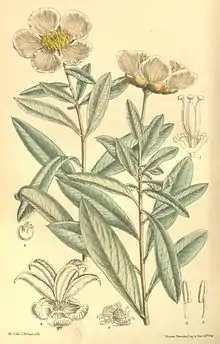Crossosomataceae
Crossosomataceae is a small plant family, consisting of three genera of shrubs found only in the dry parts of the American southwest and Mexico. This family includes four genera and ten known species.[2] The shrub like plant can vary from being 50 cm to 5 meters tall with small alternating leaves that surround the stem vastly or in small spurts. The Crossosomataceae consists of usually white flowers that are generally bisexual and have 5 petals attached to a nectary disk.[3]
| Crossosomataceae | |
|---|---|
 | |
| Crossosoma californicum | |
| Scientific classification | |
| Kingdom: | Plantae |
| Clade: | Tracheophytes |
| Clade: | Angiosperms |
| Clade: | Eudicots |
| Clade: | Rosids |
| Order: | Crossosomatales |
| Family: | Crossosomataceae Engl.[1] |
| Genera | |
| |
Genera
- Apacheria - one species, cliff brittlebush, Apacheria chiricahuensis
- Crossosoma - crossosoma (3 species, including C. bigelovii and C. californicum)
- Glossopetalon - glossopetalon (5 species)
- Velascoa - one species
References
- Angiosperm Phylogeny Group (2009). "An update of the Angiosperm Phylogeny Group classification for the orders and families of flowering plants: APG III". Botanical Journal of the Linnean Society. 161 (2): 105–121. doi:10.1111/j.1095-8339.2009.00996.x.
- Christenhusz, M. J. M. & Byng, J. W. (2016). "The number of known plants species in the world and its annual increase". Phytotaxa. 261 (3): 201–217. doi:10.11646/phytotaxa.261.3.1.
- Richardson, P. (1970). Morphology of the Crossosomataceae. I. Leaf, Stem and Node. Bulletin of the Torrey Botanical Club, 97(1), 34-39. doi:10.2307/2483988
This article is issued from Wikipedia. The text is licensed under Creative Commons - Attribution - Sharealike. Additional terms may apply for the media files.